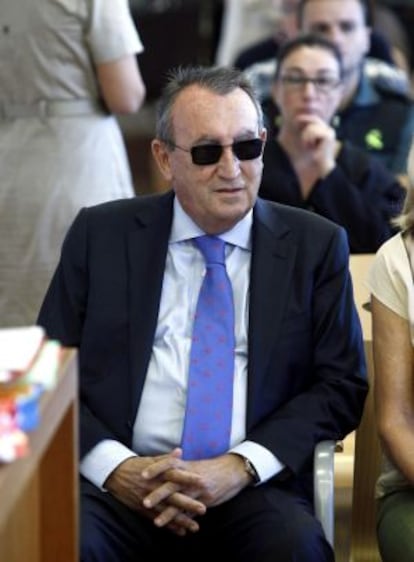Ex-Castellón chief Fabra sentenced to four years for tax fraud
Court convicts Carlos Fabra for failing to declare almost two million euros of income Former provincial leader pleased not to have been found guilty of “corruption”

Carlos Fabra, the former chief of Castellón province who became famous for building a planeless airport featuring a large statue in his honor, has been sentenced to four years in prison for tax fraud.
The anticorruption public prosecutor had requested an eight-year jail sentence for the Popular Party (PP) politician on four counts against him related to his not declaring income of almost two million euros to the tax office between 1999 and 2004 - a fraud worth almost 700,000 euros.
The Castellón provincial court absolved him of two other charges of influence peddling and bribery. In total, the prosecution had hoped for accumulated sentences of 13 years against the man who has personified power in the Mediterranean province for almost two decades.
Fabra’s ex-wife was also sentenced to two years in prison on two other tax fraud charges.
Fabra said he would have to study any appeal against the conviction with his lawyer
In the last session of the trial in October, the public prosecutor considered Fabra’s responsibility proven and emphasized the accusations of tax fraud: “He is not just any fraudster, he was president of the provincial council and while he demanded taxes he was committing fraud in the background.”
The ruling, which was made known on Monday, acquitted the businessman who has accused Fabra and his ex-wife of influence peddling and bribery. The ex-senator Miguel Prim, also charged with influenced peddling, was similarly cleared.
The sentence said that it was “unquestionable” that Fabra “was thoroughly and perfectly aware” of his accounts and deposits “made personally or by third parties.” He was also aware “of his obligation to include these amounts in his tax return,” it stated.
Fabra was also ordered to pay a fine of 693,000 euros and credit the same amount to the tax office. His ex-wife will have to pay both a 274,000-euro fine and the same sum to the tax office.
Despite the four-year sentence, the former head of the Castellón PP said he was very happy with the ruling because it did not find him guilty of bribery or influence peddling. In his view, this implied his actions had not involved any “corruption.”
Fabra, who is still secretary general of the Castellón Chamber of Commerce, said he would have to study any appeal against the conviction with his lawyer, but acknowledged that they had planned to appeal any prison sentence handed down to both the Constitutional Court and the Supreme Court.
The origins of the case stretch back to December 2003 when businessman Vicente Vilar filed a complaint accusing Fabra of receiving millions in exchange for political favors within the Health and Agriculture ministries in order to obtain permits to manufacture health products. The trial was finally held following an almost decade-long, incident-packed investigation that passed through the hands of nine judges and four prosecutors.
The Castellón court took the extenuating circumstances brought about by such delays into account in its ruling, reducing Fabra’s sentence to one year for each count of fraud against him from the two years per count requested by the public prosecutor.







































